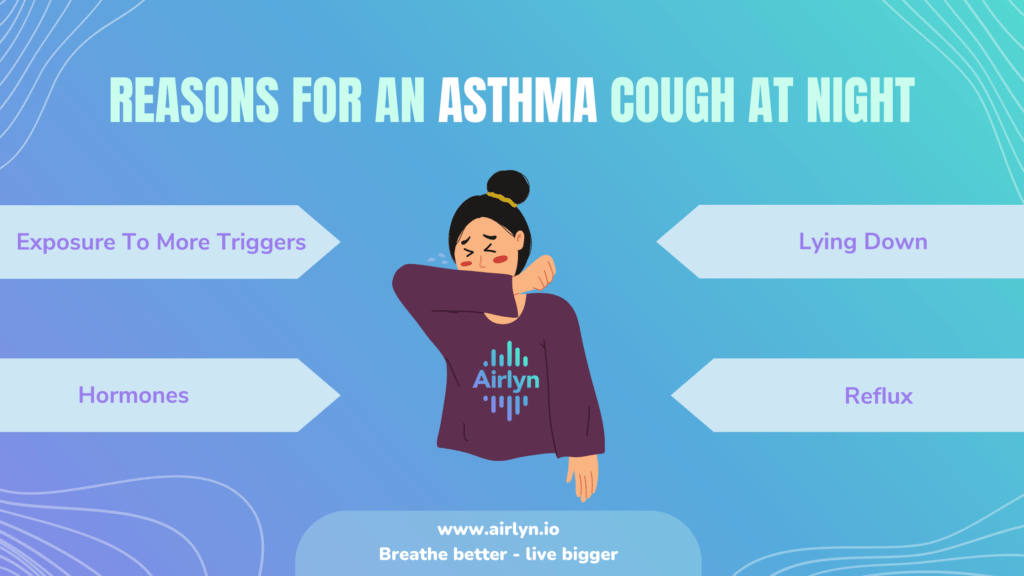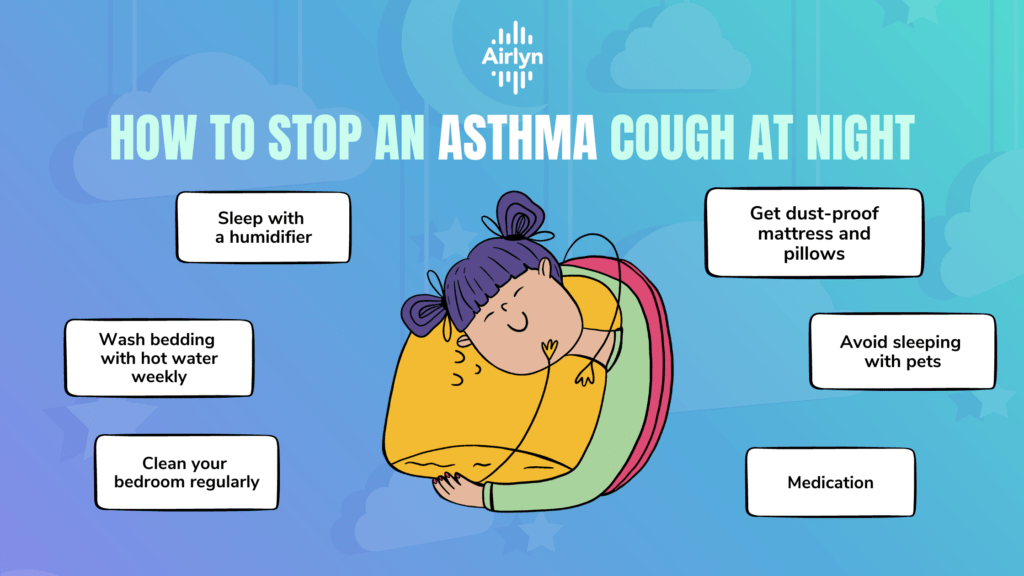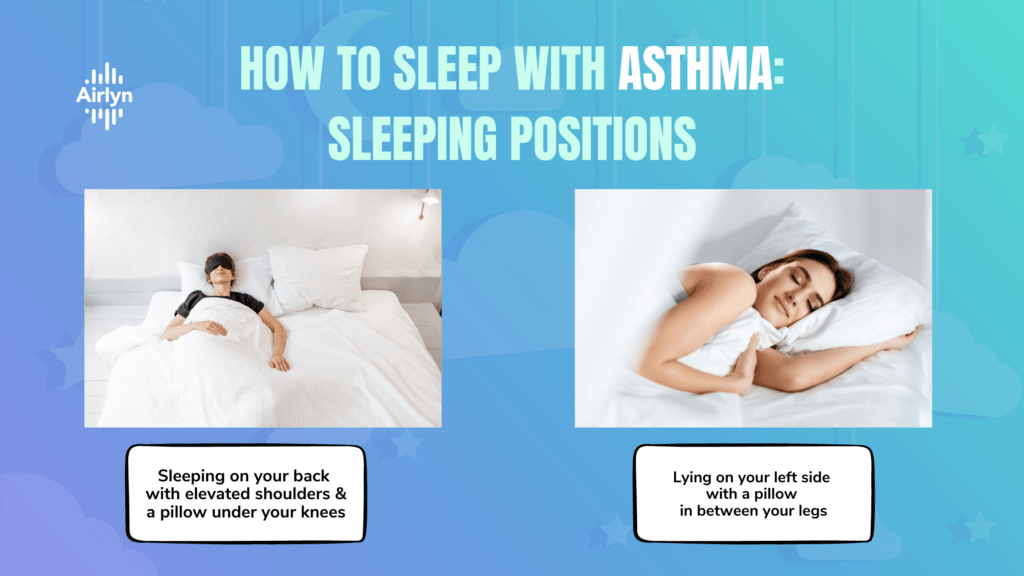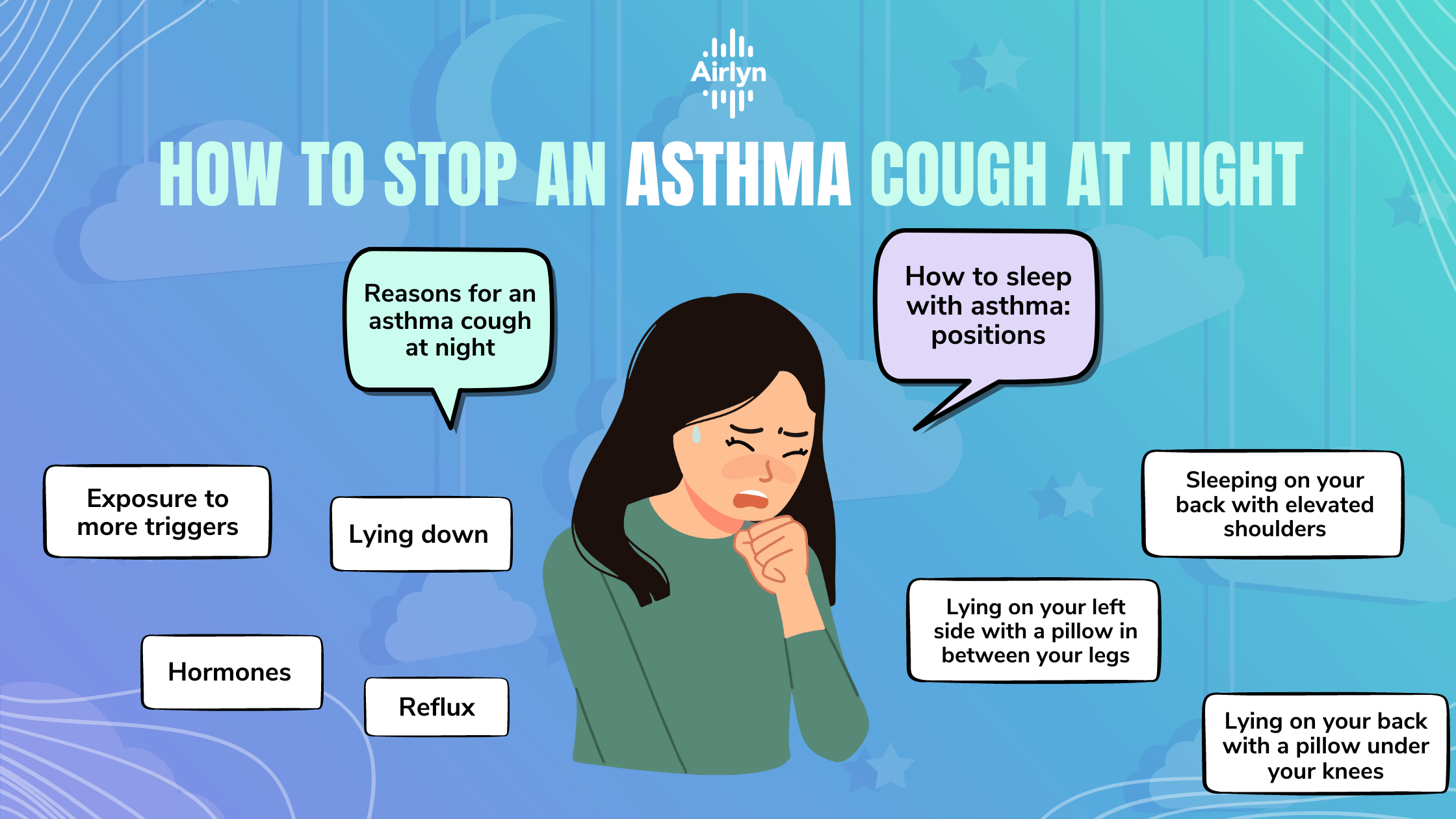If you’re reading this article then the chances are, you’ve struggled with your asthma at night. One of the most common asthma symptoms that can plague us when we’re seeking that all-important beauty sleep, is coughing. But you might also find that you get more breathless, have a tight chest, and wheeze more when you settle down into bed for the evening. We’ll run you through some of the main reasons, you might find yourself, struggling to sleep thanks to an asthma cough. Because it’s no secret that knowing the root cause of a problem is usually the key to finding the solution. We’ll also provide some of our top tips for how to calm an asthma cough at night and the best positions for catching some much-needed sleep when you have asthma.
Contents
Reasons for an Asthma Cough at Night

If coughing at night is something you’ve experienced, then you’ve probably found yourself lying there, wondering why asthma coughs are worse at night. Especially if you’ve been hunky dory all day, but then as soon as you tuck yourself into bed the waking nightmare begins. Unfortunately, the exact cause of why we sometimes cough more at night with asthma isn’t known. However, all is not lost because we do know some of the most likely reasons our asthma can trouble us more at night. Here are some of the top contenders.
Exposure to more triggers
When we go to bed, we are unknowingly exposed to more potential asthma triggers. Dust mites are the main allergen we are surrounded by at night because they live in our blankets, pillows, and duvets. Dust mites are teeny tiny little bugs, that live in soft furnishings and carpets (ew, let’s try not to think about that too much), and they can cause havoc to people with asthma, who are allergic to them. One of the best ways to tackle these tricky little critters is to wash your bedding weekly and vacuum as often as you can. Feathers in your bedding can be another asthma trigger, so if you suffer from an asthma cough at night, swapping your duvet and pillows for hypoallergenic ones might be a good idea.
Lying down
In the same way that when you’re suffering from a cold it feels ten times worse at bedtime, the simple act of reclining can cause an asthma cough. Why? Well, it’s likely because of postnasal drip, which is where mucus accumulates in the throat. Postnasal drip can be caused by lots of things, such as sinus infections, allergies, a deviated septum, and exposure to triggers such as the aforementioned dust mites (sorry, we promise we won’t keep reminding you). Depending on the cause of postnasal drip, treatments such as antihistamines are available, or for structural problems like nasal polyps, or a deviated septum, surgery could be required. This means if you think that postnasal drip might be the cause of your asthma cough at night, it’s usually a good idea to visit the doctor to try and establish the cause.
Hormones
Hormones are probably not something you associate with asthma, but surprisingly they can make asthma symptoms worse at certain times. Some hormones fluctuate in the body according to circadian rhythms, this is something experienced by everyone, but for those of us with asthma, it can cause our symptoms to worsen at night. The fluctuation of several different types of hormone levels in the body, such as epinephrine (more commonly referred to as adrenaline), cortisol, and melatonin, are all linked to an increase in asthma symptoms at night.
Reflux
Acid reflux, which is when the acid from your stomach escapes into the oesophagus, could be the cause of your asthma cough at night. A number of things can cause acid reflux, such as certain food and drink, pregnancy, smoking, and certain asthma medications, which relax the valve which normally prevents acid from the stomach from entering the oesophagus. Lying down can add to this as it can make acid reflux symptoms worse. There are over-the-counter medications that can stop acid reflux and help prevent your asthma from troubling you at night. However, as always, if in doubt it’s best to speak with your doctor who can offer specialist advice.
How to stop an asthma cough at night

Now we’ve explained some of the main causes of asthma cough at night, we’ll take you through some of the best ways to prevent it. Some of these suggestions will work better for different people, so you might find it a bit of trial and error until you find what works for you.
Sleep with a humidifier
Investing in a humidifier is a good option when you struggle with asthma coughs at night because it adds moisture to the air. On the flip side, dry air can irritate the nose and throat causing your body to produce more mucus causing you to cough.
Wash bedding in hot water weekly
We’re sorry to bring them up again, but washing your bedding in a super hot wash every week will help to keep dust mites at bay. Washing your bedding at a temperature of at least 130 degrees Fahrenheit will help to kill dust mites. It’s a good idea to follow this with tumble drying everything at a high temperature, so you can be totally sure they’re all gone.
Clean your bedroom regularly
Don’t worry, we’re not insinuating that you’re a mucky pup, but it’s even more important to keep on top of cleaning your home when you have asthma. In particular, if you find that you have an asthma cough at night, regularly dusting and vacuuming your bedroom could work wonders.
Get a dust-proof mattress and dust-proof pillow protectors
As well as the hypoallergenic duvet and pillows we mentioned earlier, another great investment for anyone with asthma, is a dust-proof pillow cover and a dust-proof mattress. You might wonder how anything can be dust-proof given that it’s everywhere? Well, that is true, but dust-proof bedding is made from a tightly woven fabric that stops those pesky little pests we won’t name again, from getting into your bed covers.
Avoid sleeping with pets in the room
We all love our furry best friends, but if you sleep with your pets in your bedroom, it could be provoking your asthma cough. You’d be forgiven for thinking, that our pets’ fur is the irritant, but it’s actually their dander. Animal dander is the dead skin cells, that our pets shed naturally, and unfortunately, it tends to stick to things like pillows and duvets. So, as much as we all love to snuggle with our fur babies, it’s best to keep your bedroom out of bounds for your pets.
Medication
Prevention, where possible, is always better than treatment, but if you’ve tried all the measures we’ve suggested and your asthma cough is still keeping you up at night, it might be time to visit your doctor.
How to Sleep with Asthma: Positions

As we’ve already mentioned, lying down itself can be the cause of your asthma cough at night. Considering the position you sleep in could be a game changer when it comes to dealing with an asthma cough when you go to bed.
Lying on your left side with a pillow in between your legs
One of the best sleeping positions for people with asthma is lying on your left side with a pillow between your legs. You may find that sleeping on your left side is enough to help stop your asthma cough at night, because of the shape of your stomach. Sleeping on your left side keeps your stomach acid at an angle, that makes it harder for it to enter the esophagus and causes an asthma cough. Sleeping on the left side also helps to reduce excessive mucus production and can increase airway space, so you can see why we think it’s the winning position for preventing an asthma cough at night! The addition of a pillow in between your legs also helps to support your back and keep your spine stable through the night.
It’s important that you sleep on the left side as opposed to the right, because sleeping on your right side can actually worsen asthma symptoms, such as an asthma cough at night. Although not true for everyone, sleeping on your right can constrict your airways and make breathing more difficult. Something none of us need, when living with asthma!
Sleeping on your back with elevated shoulders
Lying on your back using pillows to prop up your neck and shoulders is one position that may help alleviate your asthma symptoms at night. This is because it helps to reduce post-nasal drip by enabling your sinuses to drain more easily. The number of pillows you use is entirely up to you, but we’d suggest trying one or two and then adding a third if you still feel like you’re not getting enough elevation. Sleeping on your back without any elevation can worsen asthma symptoms, so it’s always a good idea to ensure your pillows are providing at least some elevation. This could mean using one firm pillow or several softer ones.
Lying on your back with a pillow under your knees
This one might mean you need to invest in an extra pillow or two! Lying on your back, propping up your head and shoulders with pillows (again as many as you feel comfortable with), and placing another pillow under bent knees could help prevent your asthma cough at night. As with the previous position, this one can help reduce post-nasal drip and the additional pillow under your knees can help prevent you from moving onto your side during the night, as well as potentially boost circulation.
To Summarise
So, hopefully, you’re feeling loaded with lots of helpful tips and tricks to try and combat an asthma cough at night. We know in the dead of night, when you’re up coughing with asthma, it feels like you’re all alone, while everyone else is sleeping, but rest assured, lots of us have had the same experience. We’ve explained some of the main causes of asthma cough at night, which we hope has helped you to understand why it has been troubling you. The best thing we can suggest is to try all of the remedies we have suggested, including trying out different sleeping positions. If you have tried everything in this article, but still find yourself coughing, it’s a good idea to contact your doctor to see if they can provide you with some medication. All that’s left for us to say is good night and we hope you sleep tight!
If you feel like this was helpful and interesting, don’t hesitate to read more in our blog section.





